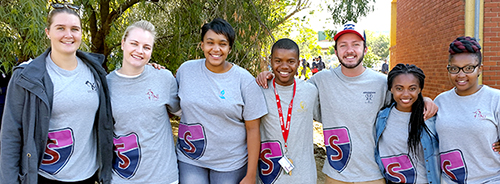Latest News Archive
Please select Category, Year, and then Month to display items
10 March 2022
|
Story Anthony Mthembu
|
Photo Unsplash
 The No Student Hungry team gearing up to start distributing food parcels to the selected students.
The No Student Hungry team gearing up to start distributing food parcels to the selected students.
The UFS is one of the many institutions of higher learning where food insecurity is an active issue. However, the
No Student Hungry Programme is one of the initiatives launched at the university to assist in fighting food insecurity at the institution.
The purpose of the programme
Since its inception in 2011, the initiative has assisted many students in acquiring a healthy meal. Additionally, the Food Environment Office also hands out food packages, so that students can continue to achieve academically. “We are trying to develop a healthy environment for students and make it easier for them to have a nice and healthy meal,” stated Annelize Visagie, who heads the Food Environment Office at the UFS. The Food Environment programme is spread out on all three campuses, each with its own facilitators. Furthermore, the programme mainly caters for students who are not funded by the National Student Financial Aid Scheme (NSFAS) but who are excelling academically. The abovementioned students apply for assistance online, and a list is then drawn up of students who receive assistance for the year.
Alternative solutions to keep the initiative running
On the Bloemfontein Campus, the No Student Hungry Programme will be catering for 200 students in the 2022 academic year, assisting them with a daily nutritious meal. Additional food parcels are also handed out to provide further assistance. “We give food parcels to the students on the list every Tuesday and Thursday at the Thakaneng Bridge,” Visagie highlighted. However, she argues that catering for the student population through this programme can be a challenge, as the demand for assistance is growing rapidly and the ability to assist is limited. The programme relies on partnerships and sponsors to assist the student body. In fact, the coordinators of the programme currently have a memorandum of understanding with Tiger Brands according to which they deliver around 100 food parcels for distribution.
In addition, the coordinators have put in place alternative measures to ensure that they can provide more food to students. “The
Kovsie Act Office, in partnership with the
Department of Sustainable Food Systems and Development, has started a food garden where healthy and nutritious produce are grown, in order to add value to the distribution,” she indicated. Although the programme can only assist to a point, students who are in desperate need of assistance are never turned away. In fact, the
Social Support Unit at Thakaneng Bridge usually assists students with food vouchers for a maximum of four days.
A commitment to teaching healthy eating habits
The programme is not only committed to curbing food insecurity, but also to ensuring that students have a healthy and balanced diet. As such, a booklet is being issued by the
Department of Nutrition and Dietetics in collaboration with the Department of Sustainable Food Systems and Development, which contains ways in which students can make a healthy meal using some of the ingredients offered in the food parcels.
“We want to teach students how to eat healthy in the cheapest way, because they don’t have a lot of money to buy expensive food products,” Visagie argued.
Colleges build community through Academic School Projects
2016-06-13
 The South College leadership visited CommTech Secondary School as part of their academic
The South College leadership visited CommTech Secondary School as part of their academic
community engagement project. From left is Alexanne Ridge, Wilmie van der Wal, Edith Le Roux,
Tuli Molebalwa, Jean-Claude Naude, Mbali Skosana and Lerato Bale.
Photo: Eddie de Wet.
Residence Life at the University of the Free State (UFS), in collaboration with the Community Engagement office, decided to pilot a School Project within colleges for 2016.
The aim of the project is to invest in, and have impact on, not only schools and the learning environment, but also the volunteering spirit of college members. The project triggers critical and reflective thinking as well as the creativity aspect of development to contribute ultimately to our social responsibilities.
Each college will visit a school throughout the year, to serve its academic needs, and to foster relationships in the broader community. Recently, North College visited Bainsvlei High School in Bloemfontein to share information and success stories about academic life as a Kovsie student. At CommTech Secondary School in the city, South College delivered sponsored tables and chairs to improve the overall learning environment.
North College consists of Madelief, Tswelopele, Vergeet-My-Nie, Veritas, and Welwitschia residences while South College includes Armentum, Emily Hobhouse, Marjolein, Kestell, NJ van der Merwe, and Villa Bravado.
“It is a great opportunity for college members to interact with the community, and it serves as motivation for the learners. The learners were very enthusiastic about our visit, and I trust that the South College students will motivate them to complete their high-school career and join us at UFS”, said Wilmie van der Wal, College Coordinator.
The projects will continue during the second semester with the different colleges. Everyone can look forward to significant life-changing stories. A quote by Archbishop Desmond Tutu serves as motivation in this regard: “Do your little bit of good where you are; it’s those little bits of good put together that overwhelm the world”.